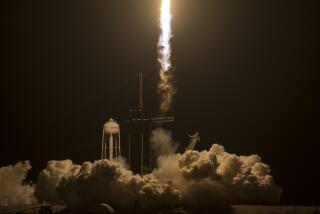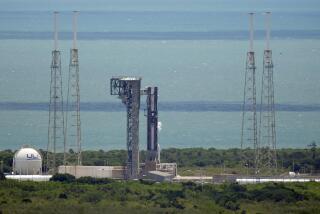McDonnell Douglas Identifies Delta II Rocket Malfunction
HUNTINGTON BEACH — McDonnell Douglas said that several explosive lines used to separate rocket motors from the launch vehicle failed during the Aug. 5 launch of one of its Delta II rockets carrying a Korean communications satellite. Although the malfunction prevented the Delta rocket from reaching proper altitude, the satellite was placed in orbit with its own motors.
Preliminary results of an internal investigation by the company’s Huntington Beach space and defense systems division showed that excessive heat damaged the explosive lines, preventing one of the nine rocket motors from being jettisoned from the first stage of the three-stage rocket.
Company officials said insulation will be added to the explosive lines and that the next rocket will carry instruments to measure heat and other factors that could affect the separation system.
The next Delta II launch, at Vandenberg Air Force Base for NASA, has been rescheduled from Wednesday to mid-October to allow time to make the modifications. A second NASA launch originally scheduled for Oct. 12 at Cape Canaveral has been rescheduled to early November. A McDonnell Douglas spokesman said the company will launch a second Korean communications satellite on Dec. 20.
More to Read
Sign up for Essential California
The most important California stories and recommendations in your inbox every morning.
You may occasionally receive promotional content from the Los Angeles Times.










